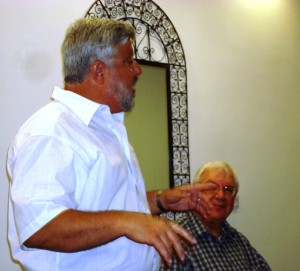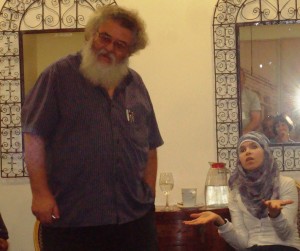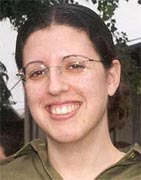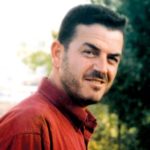Gershon Baskin thinks that we should let the people in Gaza see the opportunity for real peace, since if they did see the opportunity it wouldn’t be long before they ousted the extremists in an Arab Spring of their own.

Gershon Baskin, director of the Israel-Palestine Center for Research and Information (IPCRI) and Co-CEO Hanna Siniora
The candidates are angling for votes, not Nobel prizes and gain nothing by discussing a conflict that seems so far from resolution. Obama, like every president before him, tried to assert U.S. influence over the peace process early in his term, and it only brought him tsuris. It’s not clear what else Romney could have said on the topic that would have earned him more votes in Florida or Ohio. Like global warming and gun violence, the Israeli-Palestinian conflict has become an unmentionable topic on the campaign trail.
Not that Israelis or Palestinians are clamoring for such a debate. I was in Israel last week and it was the rare newspaper or broadcast that even mentioned the peace process, except to update its obituary. Dominating the headlines were Iran and January’s elections, in which the conflict barely figures. The Palestinians held municipal elections on Friday, and the big issues were a Hamas boycott and low voter turnout. Jimmy Carter met with Israeli President Shimon Peres Monday, and when Jimmy Carter is the loudest voice for peace, you just sense that it’s not going anywhere.
But you also sense the price both sides pay for not addressing this most intractable of issues. I was in Israel with a delegation from the Newark Interfaith Coalition for Hope & Peace. A lot of the Israelis and Palestinians who spoke to the group were still talking peace, although without much hope.
Although most of the presenters were on the Left, they rarely spoke about the conflict in terms of righting historic wrongs or resolving a human rights crisis among the Palestinians.
Instead, they spoke about Israel’s self-interest in helping to create a Palestinian state. And they suggested domino effects that defy the usual categories of Left and Right. Gershon Baskin, an American-born Israeli who codirects the Israel Palestine Center for Research and Information, spoke, as most two-state proponents do, of preserving Israel as a Jewish democracy. But he also imagined the effects of peace on other players in the region. Asked about Hamas rejectionism, Baskin said, “Let the people in Gaza see the opportunity for real peace.” If they did, he proposed, it wouldn’t be long before they ousted the extremists in an Arab Spring of their own.
That sort of thinking is optimist, yes, but not delusional — unlike the proposition that Israel can continue to control the lives of millions of non-citizens and still preserve both its Jewish character and democratic ideals.
I also don’t remember when optimism stopped being a Jewish ideal. You can find it everywhere you look in Israel, if you are open to voices other than those that thrive on hopelessness. One evening the interfaith coalition hosted two members of the Parents Circle Families Forum, which brings together grieving parents on both sides who lost relatives in the conflict. Ben Kfir explained, in careful, mournful detail, how his daughter Yael, an officer in the Signal Corps, was murdered in a suicide attack while waiting for a bus near her base in September 2003. Moira Jilani, a U.S. citizen, gave a dry-eyed account of the day her Palestinian husband was shot dead by Israeli police in East Jerusalem in 2010, and her efforts to reopen an investigation into what the Justice Ministry called a justifiable response to an alleged terrorist incident.Kfir and Jilani, sitting together, don’t ask that you take sides in the conflict, only that you consider the pain and loss on both sides. Kfir remembered loading two pistols and plotting the murder of random Palestinians to avenge the murder of his daughter. And then how he realized that the only result would be more families grieving like his own. In a newspaper ad thanking those who came to the shiva, he wrote, “Bringing peace closer will be our condolence.”
Such leaps of empathy aren’t much in fashion these days, no more so than a discussion of the peace process on the campaign trail. But if you can’t talk about peace, you are endorsing its opposite.
—
Capt. Yael Kfir
The bomber wore civilian clothes and carried a leather bag containing a 3-4 kilogram bomb. He got out of a car at the hitchhiking post, and almost immediately blew himself up, killing eight and wounding 30. The ninth victim died of her wounds on November 19.
Yael Kfir graduated from the High School for the Arts in Ashkelon, majoring in theater. Alongside this, her father said, she had a scientific mind, completing her math matriculation exam for the maximum 5 points with a grade of 100. She had been offered scholarships at several universities, but hadn’t made up her mind what to study. In the meantime, alongside her IDF service as an instructor in the Signal Corps at the Tzrifin army base, she was studying math and history at the Open University. Yael was killed on her way home.
Yael dreamt of becoming an astronaut and wanted to be on the first manned mission to Mars. Two weeks ago had sent an e-mail to NASA, asking them to advise her if she should study astronomy or astrophysics. “She had enough dreams for dozens of people, said her father.”
Capt. Yael Kfir was buried in the Ashkelon military cemetery. She is survived by her parents, Ben and Yaffa, and an older sister Tal.
Ziad Jilani
The State Prosecutor’s Office assessed the case files and decided not to file an indictment against the Maxim Vinogradov and Shadi Kheir al-Din, who pursued Jilani and shot at him after he swerved out of his lane and hit several policemen with his car. They claimed they were sure this was an intentional attack and the driver was a terrorist.
The deceased’s widow, Moira, and their three daughters, Hana, Mirage and Yasmin, petitioned the High Court of Justice with a request that would require the State Prosecutor’s Office to explain why it had decided to close the case.




